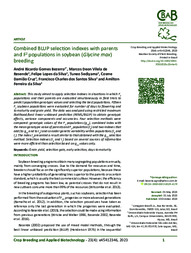Combined BLUP selection indexes with parents and F2 populations in soybean (Glycine max) breeding.
Combined BLUP selection indexes with parents and F2 populations in soybean (Glycine max) breeding.
Author(s): BEZERRA, A. R. G.; RESENDE, M. D. V. de; SILVA, F. L. da; SEDIYAMA, T.; CRUZ, C. D.; SILVA, F. C. dos S.; SILVA, A. F. da
Summary: This study aimed to apply selection indexes in situations in which F2 populations and their parents are evaluated simultaneously in field trials to predict population genotypic values and selecting the best populations. Fifteen F2 soybean populations were evaluated for number of days to flowering and to maturity and grain yield. The data was analyzed using restricted maximum likelihood/best linear unbiased prediction (REML/BLUP) to obtain genotypic effects, variance components and accuracies. Four selection methods were compared: genotypic values of the F2 populations (gF2), combined index with the mean genotypic value of parents and F2 population (Ia) and two indexes that add (to gF2 and to Ia) and consider genetic variability within populations (Ib and Ic). The index Ia presented a result similar to that obtained with the gF2 selection method. Selection indexes (Ib and Ic) based on several sources of information were more efficient than selection based on gF2 values only.
Publication year: 2023
Types of publication: Journal article
Unit: Embrapa Coffee
Keywords: Early selection, Grain yield, Plant breeding, Soybeans
Observation
Some of Embrapa's publications are published as ePub files. To read them, use or download one of the following free software options to your computer or mobile device. Android: Google Play Books; IOS: iBooks; Windows and Linux: Calibre.
Access other publications
Access the Agricultural Research Database (BDPA) to consult Embrapa's full library collection and records.
Visit Embrapa Bookstore to purchase books and other publications sold by Embrapa.

